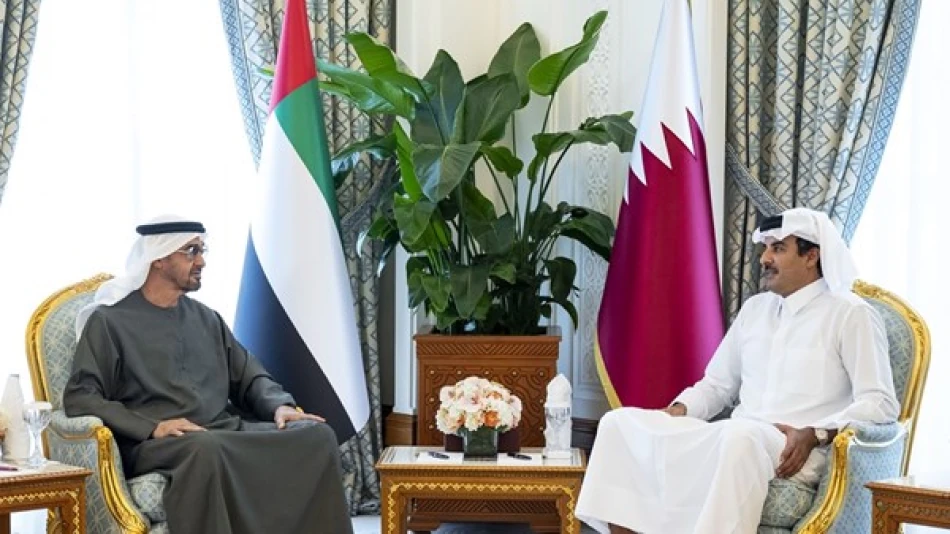
UAE President Reaffirms Support for Qatar's Sovereignty and Territorial Integrity
UAE President Makes Rare Diplomatic Visit to Qatar Amid Regional Security Concerns
UAE President Sheikh Mohamed bin Zayed Al Nahyan conducted a high-level diplomatic mission to Doha, meeting with Qatar's Emir Sheikh Tamim bin Hamad Al Thani to discuss bilateral relations and express solidarity over recent Israeli actions on Qatari territory. The visit, accompanied by a senior delegation including Dubai's Crown Prince and key security officials, signals deepening Gulf cooperation amid escalating regional tensions.
Strategic Timing of Gulf Unity
The timing of this diplomatic engagement reflects the evolving security landscape in the Gulf region. Sheikh Mohamed's visit to the Amiri Diwan in Doha comes as Gulf states increasingly coordinate their responses to external threats, marking a continuation of the reconciliation that began with the 2021 Al-Ula Declaration that ended the Gulf blockade of Qatar.
The UAE President reaffirmed his country's complete solidarity with Qatar and support for all measures taken to preserve its sovereignty, territorial integrity, and the safety of its people. This public backing demonstrates how quickly Gulf relations have normalized since the diplomatic crisis that lasted from 2017 to 2021.
Sovereignty Concerns Take Center Stage
International Law Violations
Sheikh Mohamed characterized the Israeli actions as a violation of Qatar's sovereignty and all international laws and norms, stating that such incidents undermine regional security, stability, and peace prospects. This represents a unified Gulf position on territorial sovereignty, regardless of the actors involved.
The UAE leader praised Sheikh Tamim's efforts toward regional peace and stability, acknowledging Qatar's unique diplomatic role in mediating conflicts across the Middle East, from Gaza to Afghanistan.
High-Level Diplomatic Machinery in Motion
The composition of the UAE delegation underscores the visit's significance. The entourage included:
Key figures: Dubai Crown Prince Sheikh Hamdan bin Mohammed bin Rashid Al Maktoum, Abu Dhabi Deputy Ruler Sheikh Tahnoun bin Zayed Al Nahyan, Interior Minister Sheikh Saif bin Zayed Al Nahyan, and Industry Minister Dr. Sultan Al Jaber, among other senior officials.
This level of representation typically accompanies visits addressing critical security or economic matters, suggesting the discussions went beyond routine diplomatic courtesy calls.
Regional Implications and Strategic Calculations
Gulf Security Architecture
The visit reflects the Gulf states' recognition that regional security challenges require coordinated responses. Unlike previous decades when Gulf countries might have pursued separate diplomatic tracks, the current approach emphasizes collective positioning on sovereignty issues.
Qatar's role as a mediator in regional conflicts, combined with the UAE's growing influence in regional affairs, creates a diplomatic partnership that could prove crucial for future crisis management in the Middle East.
Economic Undercurrents
While security dominated the public messaging, such high-level meetings typically advance economic cooperation. Both countries have been diversifying their economies away from oil dependency, with Qatar leveraging its natural gas resources and World Cup infrastructure investments, while the UAE positions itself as a regional business and technology hub.
The presence of multiple UAE economic officials suggests discussions likely covered trade facilitation, investment opportunities, and coordination on major regional projects.
Most Viewed News

 Layla Al Mansoori
Layla Al Mansoori






